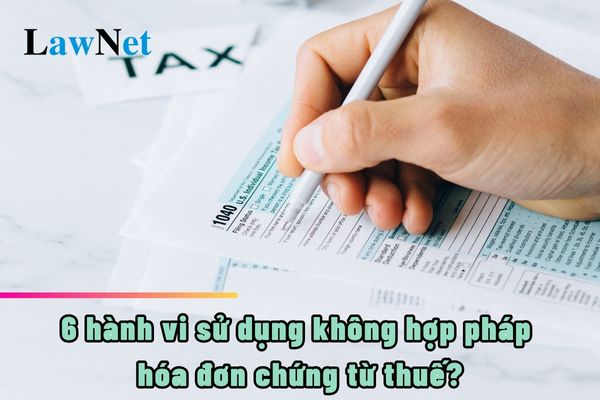Six Acts of Illegal Use of Tax Invoices and Documents?
Six Acts of Illegally Using Tax Invoices and Documents
Pursuant to Clause 2, Article 4 of Decree 125/2020/ND-CP, the regulations are as follows:
Acts of using illegal invoices and documents; using invoices and documents illegally
1. The following cases of invoice and document usage are deemed illegal:
a) Fake invoices and documents;
b) Invoices and documents that have not yet come into effect or have expired;
c) Invoices suspended through enforcement measures, except when authorized by tax authorities;
d) Unregistered electronic invoices with tax authorities;
đ) Electronic invoices lacking tax authority codes when such codes are required;
e) Invoices for goods and services with issue dates after the tax authority has identified the seller as non-operational at the registered business address;
g) Invoices, documents for goods and services with issue dates before tax authorities have concluded the issuer is non-operational at the registered business address, yet determined by tax or police authorities as illegal.
2. The following cases of invoice and document usage are deemed illegal usage:
a) Invoices and documents lacking mandatory contents; tampered or illicitly altered invoices;
b) Fake invoices and documents that reflect non-existent transactions; invoices that misrepresent actual value or are counterfeit;
c) Invoices reflecting discrepancies in goods/services value or deviations in required fields across invoice copies;
d) Reused invoices during goods transportation for different items/services;
đ) Invoices/documents from unrelated entities to legitimize transactions;
e) Invoices/documents identified by authorities as illegally used.
Thus, according to the regulations, six acts of illegal usage of tax invoices and documents include:
[1] Invoices/documents lacking mandatory content; tampered or illicitly altered invoices;
[2] Fake invoices/documents that reflect non-existent transactions or misrepresent actual value;
[3] Invoices with discrepancies in goods/services value or required fields across copies;
[4] Reused invoices during transportation for different items/services;
[5] Invoices/documents from unrelated entities to legitimize transactions;
[6] Invoices/documents identified by authorities as illegally used.

Six Acts of Illegally Using Tax Invoices and Documents? (Image from Internet)
Five Principles of Sanctioning Administrative Violations Regarding Tax Invoices and Documents
According to Article 5 of Decree 125/2020/ND-CP, the five principles for sanctioning administrative violations in terms of tax invoices and documents are as follows:
Principle 1. Sanctions for administrative violations regarding tax and invoices are executed in accordance with tax management laws and laws on handling administrative violations.
Principle 2. Organizations and individuals are only sanctioned for administrative violations regarding tax and invoices when such violations occur as specified in this Decree.
Principle 3. Multiple violations result in separate sanctions unless:
- At one time, if a taxpayer wrongly declares multiple indicators on tax returns of the same tax, it results in a penalty for the highest monetary sanction among misdeclarations;
- If a taxpayer submits late multiple tax returns of the same tax simultaneously, it results in one highest monetary sanction;
Cases involving tax evasion are separately prosecuted;
- Simultaneous late notifications/reports on invoices lead to a single penalty for the highest monetary offense;
- Illegal use of invoices, if sanctioned by Articles 16, 17 Decree 125/2020/ND-CP, won't be penalized under Article 28.
Principle 4: When multiple violations occur in an administrative procedure, each act is penalized separately.
Principle 5: For the same tax invoice violation, fines for organizations are double those for individuals, except as specified in Articles 16, 17, and 18 Decree 125/2020/ND-CP.
How Is Large-Scale Tax Administrative Violation Determined?
According to Article 6 of Decree 125/2020/ND-CP, the regulations are as follows:
Aggravating and Mitigating Circumstances in Tax, Invoices
1. Circumstances of aggravation and mitigation are processed as per administrative violation laws.
2. Administrative violations involving tax amounts from 100,000,000 VND or goods/services value from 500,000,000 VND are defined as large-scale tax violations under Point l, Clause 1, Article 10 of the Law on Handling Administrative Violations. Violations spanning 10 or more invoices are defined as large-scale invoice violations.
Therefore, according to the regulations, large-scale tax administrative violations are identified when the tax amounts are from 100,000,000 VND or goods/services value from 500,000,000 VND.

